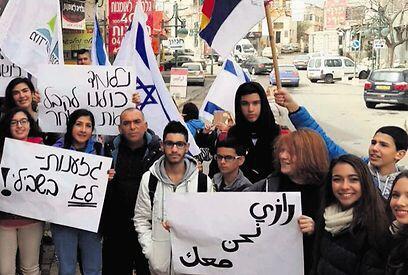The most urgent issue on the agenda, which is penetrating the Israeli educational system, is dealing with growing racism.
At the beginning of the school year, teachers were forced to handle expressions of racism and xenophobia which flooded the classrooms following the summer's war in Gaza and the wave of violence and racism which followed. Teachers reported a rise in expressions of racism during the classes and all the more so outside the classroom – during recess, school trips and other activities.
The Jewish-Arab rift reached a boiling point over the summer, and the Education Ministry even distributed special lesson plans on racism for the first two weeks of the school year in an attempt to help teachers cope with the situation.
Half a year has passed since then, and the racism and violence have not disappeared from the streets. In the past few weeks we have witnessed two incidents in which Arabs-Druze were assaulted in the public domain just because they dared speak Arabic.
This murky wave of racism and violence concerns many citizens in Israel – parents of schoolchildren, teachers and worried citizens – but the public debate of the election period seems to be jumping over it, coming down to racist and excluding statements which only increase the polarization and hatred.
Jews and Arabs will continue to live together in the State of Israel – work, study and live together or next to each other. The question is what will this life, our life and our children's life, look like. Will hatred and fear, violence and racism, become marginal phenomena or dictate the reality of our joint life?
1 View gallery


Jews and Arabs will continue to live together in the State of Israel. The question is what will this life, our life and our children's life, look like (private photo)
(צילום: פרטי)
So far, and not unintentionally, the political candidates and parties have avoided dealing with issues of a joint society, racism and polarization. They may be avoiding discussing the problem and possible solutions, but we are not letting go. The answer to this question is concealed first and foremost in the education.
For example, the Ya Salam program teaching the Arabic language and culture, which is operated by the Abraham Fund in full cooperation with the Education Ministry and is taught by Arab teachers in some 220 Jewish elementary schools. An evaluation study of the program conducted by the Henrietta Szold Institute clearly shows that the Arab teacher's presence in the classroom and the study of conversational Arabic reduce negative attitudes and prejudice towards Arabs.
Numerous studies point to the immense value of programs which include ongoing and thorough meetings with students from the other group.
In 2009, the Education Ministry received the report of the Public Committee for Coexistence Education, which was appointed by then-Education Minister Yuli Tamir to define a policy in the field of shared life education for Arabs and Jews and headed by Prof. Gabi Salomon and Dr. Mohammed Issawi. The report presents a comprehensive plan for holistically including the issue of shared life education in the educational system, from preschool to the 12th grade, through a variety of school subjects.
Despite its huge importance for building a more tolerant society, the Salomon-Issawi Report has yet to be implemented. It is still very relevant and serves as an excellent road map for steps that the educational system should take on shared life education. It's not too late to blow the dust off the report and allot the required budgets.
The majority of the public definitely support this: A survey conducted by the Forum of Organizations for Shared Life Education among a representatives sample of 594 Jews and Arabs after the past summer revealed that 65% of respondents believe the Education Ministry is not investing enough in advancing shared life education for Jews and Arabs in Israel.
In light of this, and following the difficult summer the Israeli society went through, we should expect at least some of the politicians and different parties to deal with the issue of fighting violence, helping Jews and Arabs to get to know each, expanding educational programs for the creation of a dialogue, etc.
But no, why should they deal with real issues concerning the citizens, when they have an escapeway to more "convenient" issues, like Netanyahu's Congress speech or a television debate, instead of presenting their opinions and solutions in regards to Jewish-Arab relations and racism?
They hardly address the issue, but we want answers. Eradicating racism and a shared life education are imperative for all of us – citizens, parents, students, teachers and the entire Israeli society.
Hazar Masri-Hussein is director of education at the Abraham Fund Initiatives, a non-profit organization working to promote coexistence and equality among Jews and Arabs in Israel, and a member of the Forum of Organizations for Shared Life Education.

